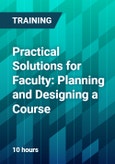For faculty searching for a deeper understanding of course planning tools such as backward design, mastery grading, and universal design for learning, this Online Course provides you with practical guidance from expert educators who have implemented these strategies in their own classrooms.
Successful student learning begins with an effectively designed course. In fact, student engagement and deep learning increase when courses are well planned with purposeful, measurable learning outcomes. Most faculty are aware of concepts such as backward design, mastery learning, specifications grading, and universal design for learning but actually implementing these concepts during course planning can be daunting.
Practical Solutions for Faculty: Planning and Designing a Course is a 10.5-hour Online Course in which tenured experts guide you through implementing these typically daunting concepts so you plan your next course or revitalize an existing one in the most effective and efficient ways possible.
Practical Solutions for Faculty: Planning and Designing a Course provides an overview of-as well as practical steps to implement-key concepts in creating a college-level course: Planning, Backward Design, Assessment and Grading, and Universal Design for Learning. Each area contains short programs that cover highly important questions and topics related to successfully planning and designing a course.
Learning Goals
After completing Practical Solutions for Faculty: Planning and Designing a Course, you’ll be able to:
- Develop a course plan for your online, blended, or face-to-face course that includes topics, content, objectives, and assessments
- Create a course planning framework that minimizes stress for instructors and students alike
- Determine the four different types of choice that can be used in face-to-face and online course
- Implement plans to assist students in different aspects of navigating the change curve
- Identify practical ways to incorporate backward design principles into your own course design workflow
- Discuss the purpose and best practices of course outcome design
- Apply the principles of backwards design to any teaching opportunity
- Analyze potential ways to leverage technology to implement mastery learning while grading
- Adopt a scaffolded grade structure that rests on completion-only and feedback-only learner activities
- Design assessments that target competency vs. factual knowledge
- Strategically align assessments with the appropriate level of cognition (Blooms Taxonomy)
- Identify curricular designs that support the integration of post-exam reviews into course design
- Explain how UDL provides structure to design flexible assessments which gives students the opportunity to show what they know in more than one way
- Help time-pressed students find more time to study
- Understand how to outline specific ways to begin to implement expert-level aspects of the universal design for learning (UDL) framework
This asynchronous course also features transcripts, note-taking guides, supplementary materials, and regular assessments to enhance your learning, as well as a certificate of completion at the end of the course.
Who Will Benefit From This Course:
- Faculty
- Educational Developers
- Instructional Designers








